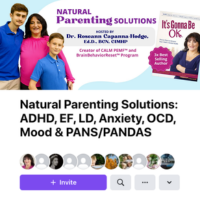It is hard enough when you struggle with executive functioning but then add in anxiety or depression, then starting or finishing a task becomes ten times as hard. The reality is that most kids and individuals with executive functioning challenges also face anxiety about their inability to be organized and just get stuff done.
What Are the Key Challenges in Those with Executive Functioning Issues?
Individuals with executive functioning difficulties or executive functioning dysfunction just don’t see the end result of what they are working toward and that makes it hard to organize, have cognitive flexibility, problem solve, and complete daily tasks. You may have heard of the term executive functioning but aren’t sure what it looks like in real life.
Common Executive Functioning Difficulties
- Planning
- Prioritization
- Problem solving
- Defining and achieving goals
- Organizing their behavior
- Organizing their items
- Time management
- Self-awareness
- Self-regulation of behaviors, emotions, and attention
- Stress tolerance
- Flexibility (cognitive and behavioral)
- Putting the breaks on behaviors, thoughts, and words
- Working memory (verbal and nonverbal)
Why Are Kids With ADHD and Executive Functioning Problems So Anxious?
We often think of an absent minded professor fondly, but in the real world, being forgetful, disorganized and needing constant reminders is super stressful. When you aren’t connecting what you are doing right now toward a future goal, you don’t understand why your teacher asks you six times to get started on the writing assignment or when your mom asks you every day to hang your book bag up.
For someone with poor executive functioning, their brain doesn’t “see” in their mind’s eye what that end goal, task, or objective is so they literally don’t know what they are working towards. That is why kids rely over and over on adults to organize them, get them started and stay on task to finish because they don’t “see” the finished product. Aha moment!
Executive functioning affects one’s emotional control and how kids respond to stressors. Cognitive, emotional, and behavioral flexibility are critical skills in how one manages stress. The frontal lobe is an important part of the emotional regulation system and works with the limbic and occipital regions in managing small and big stressors.
Anxiety and Executive Functioning in Children, Teens, and College Kids
With every passing year, kids are expected to do more challenging tasks with increasing writing demands. For kids with anxiety and executive functioning disorder, the process of getting their thoughts down on the page is overwhelming. Writing requires a tremendous amount of sustained attention, cognitive and language skills, as well as motor skills that all need to be coordinated by the executive functioning center of the brain.
Starting and completing tasks when you have an executive function dysfunction challenge that is only compounded by other mental health issues such as anxiety, depression, OCD or a learning disability, such as dyslexia. These clinical issues take up more mind real estate when there is already a shortage. Worried thoughts interfere with focus and cognitive engagement.
For school aged children, middle and high schoolers, they benefit from the routine and structure that school provides, which results in greater work production. However, when these same kids go to college, that structure of hours a day in a classroom disappears and so does their work production.
Executive Functioning and Anxiety Support in College
If a teen hasn’t developed good executive functioning skills by the time they go to college, then getting EF and anxiety support is critical for academic success. Without support, many anxious teens with EF challenges are unable to finish a task and that means they will flunk out. That can lead to a downward emotional spiral and is a major root cause of failure to launch young adults.
These young adults often question, “Do I have executive dysfunction or is this ADHD?” often at the suggestion of their parents or even a friend. Attention-deficit Hyperactivity Disorder ADHD is a separate clinical condition and not the same as executive functioning dysfunction, although the two overlap.
What is Academic Anxiety Like For Kids With Executive Functioning Problems?
Problems with attention and executive functioning cause difficulty learning new information especially due to the impact on a person’s working memory and planning and prioritizing skills.
These bright kids often know the content but just can’t coordinate their efforts to get anything done. Test anxiety and executive functioning are also common due to serious gaps in working memory. Anxiety or depression are always sure to follow as their self esteem plummets as internal and family conflict rise. It’s hard for parents to make sense of how their teen did well enough in high school and then make the expensive mistake of flunking out.
Breaking the cycle of anxiety and executive functioning disorder is key to helping your college kid launch. Kids will shut down when overwhelmed.
Now that you understand what the obstacle is, I want you to know that kids can develop good executive functioning skills and you can help them. If you suspect your child has anxiety or an anxiety disorder, getting your anxious child help and getting the right medical advice and plan is imperative for their success in all aspects of their life.
Always remember… “Calm Brain, Happy Family™”
Disclaimer: This article is not intended to give health advice and it is recommended to consult with a physician before beginning any new wellness regime.

Are you looking for SOLUTIONS for your child or teen struggling with executive functioning?
Dr. Roseann and her team are all about solutions for kids with EF issues who need blossoming, so you are in the right place!
Register for Dr, Roseann's FREE webinar, 5 Ways to Boost Your Child’s Executive Functioning and Attention at School, where Dr. Roseann will show you how to help your child or teen be more alert, listen, develop skills to be independent and self-sufficient and improve task completion.
Need help parenting a child with executive functioning issues, there are 3 ways to work with Dr. Roseann:
- In-person at her Ridgefield, CT center
- Virtually with her at home neurofeedback and coaching programs
- By getting her Get Unstuck Program
You can get her books for parents and professionals, including: It’s Gonna Be OK™: Proven Ways to Improve Your Child’s Mental Health, Teletherapy Toolkit™ and Brain Under Attack: A Resource For Parents and Caregivers of Children With PANS, PANDAS, and Autoimmune Encephalopathy.
Always remember… “Calm Brain, Happy Family™”
Are you looking for SOLUTIONS for your struggling child or teen?
Dr. Roseann and her team are all about solutions, so you are in the right place!
There are 3 ways to work with Dr. Roseann:
You can get her books for parents and professionals, including: It’s Gonna Be OK™: Proven Ways to Improve Your Child’s Mental Health, Teletherapy Toolkit™ and Brain Under Attack: A Resource For Parents and Caregivers of Children With PANS, PANDAS, and Autoimmune Encephalopathy.
If you are a business or organization that needs proactive guidance to support employee mental health or an organization looking for a brand representative, check out Dr. Roseann’s media page and professional speaking page to see how we can work together.
Dr. Roseann is a Children’s Mental Health Expert and Therapist who has been featured in/on hundreds of media outlets including, CBS, NBC, FOX News, PIX11 NYC, The New York Times, The Washington Post,, Business Insider, USA Today, CNET, Marth Stewart, and PARENTS. FORBES called her, “A thought leader in children’s mental health.”

She is the founder and director of The Global Institute of Children’s Mental Health and Dr. Roseann Capanna-Hodge. Dr. Roseann is a Board Certified Neurofeedback (BCN) Practitioner, a Board Member of the Northeast Region Biofeedback Society (NRBS), Certified Integrative Medicine Mental Health Provider (CMHIMP) and an Amen Clinic Certified Brain Health Coach. She is also a member of The International Lyme Disease and Associated Disease Society (ILADS), The American Psychological Association (APA), Anxiety and Depression Association of America (ADAA) National Association of School Psychologists (NASP), International OCD Foundation (IOCDF) International Society for Neurofeedback and Research (ISNR) and The Association of Applied Psychophysiology and Biofeedback (AAPB).
© Roseann-Capanna-Hodge, LLC 2023
Disclaimer: This article is not intended to give health advice and it is recommended to consult with a physician before beginning any new wellness regime. *The effectiveness of diagnosis and treatment vary by patient and condition. Dr. Roseann Capanna-Hodge, LLC does not guarantee certain results.













